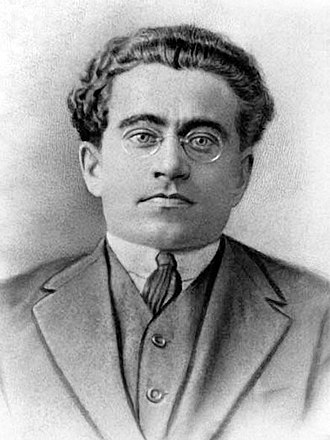Antonio Gramsci
Antonio Gramsci (Italian: [anˈtɔːnjo ˈɡramʃi]; 22 January 1891 – 27 April 1937) was an Italian writer, politician, political theorist, philosopher, sociologist, and linguist.[1] He was a founding member and onetime leader of the Communist Party of Italy and was imprisoned by Benito Mussolini's Fascist regime.
Antonio Gramsci | |
|---|---|
 Antonio Gramsci, 1922 | |
| Born | 22 January 1891 |
| Died | 27 April 1937 (aged 46) Rome, Lazio, Italy |
| Era | 20th-century philosophy |
| Region | Western Philosophy |
| School | Marxism |
Main interests | Politics, Ideology, Culture |
Notable ideas | Hegemony, war of position, the distinction between "traditional" and "organic" intellectuals |
Gramsci was one of the most important Marxist thinkers in the 20th century. He is a notable figure within modern European thought and his writings analyze culture and political leadership called "hegemony". He is known for his theory of cultural hegemony, which describes how states use cultural institutions to maintain power in capitalist societies.
Antonio Gramsci Media
Former Gymnasium Carta-Meloni in Santu Lussurgiu, which Gramsci attended from 1905 to 1907
The Rectorate at the University of Turin, where Gramsci studied
A commemorative plaque for Gramsci in Mokhovaya Street 16, Moscow. Translated, the inscription reads: "In this building in 1922–1923 worked the eminent figure of international communism and the labour movement and founder of the Italian Communist Party, Antonio Gramsci."
Gramsci's grave at the Cimitero Acattolico in Rome
Gramsci's many prison notebooks
Related pages
References
- ↑ Owen, Richard (25 November 2008). The founder of Italian Communism had deathbed conversion. http://www.timesonline.co.uk/tol/comment/faith/article5232492.ece. Retrieved 4 December 2010.
Other websites
- Gramsci's writings at MIA
- The International Gramsci Society
- "Notes on Language". TELOS
- Fondazione Instituto Gramsci
- Special issue of International Socialism journal with a collection on Gramsci's legacy Archived 2007-09-26 at the Wayback Machine
- Roberto Robaina: Gramsci and revolution: a necessary clarification
- Dan Jakopovich: Revolution and the Party in Gramsci's Thought: A Modern Application



